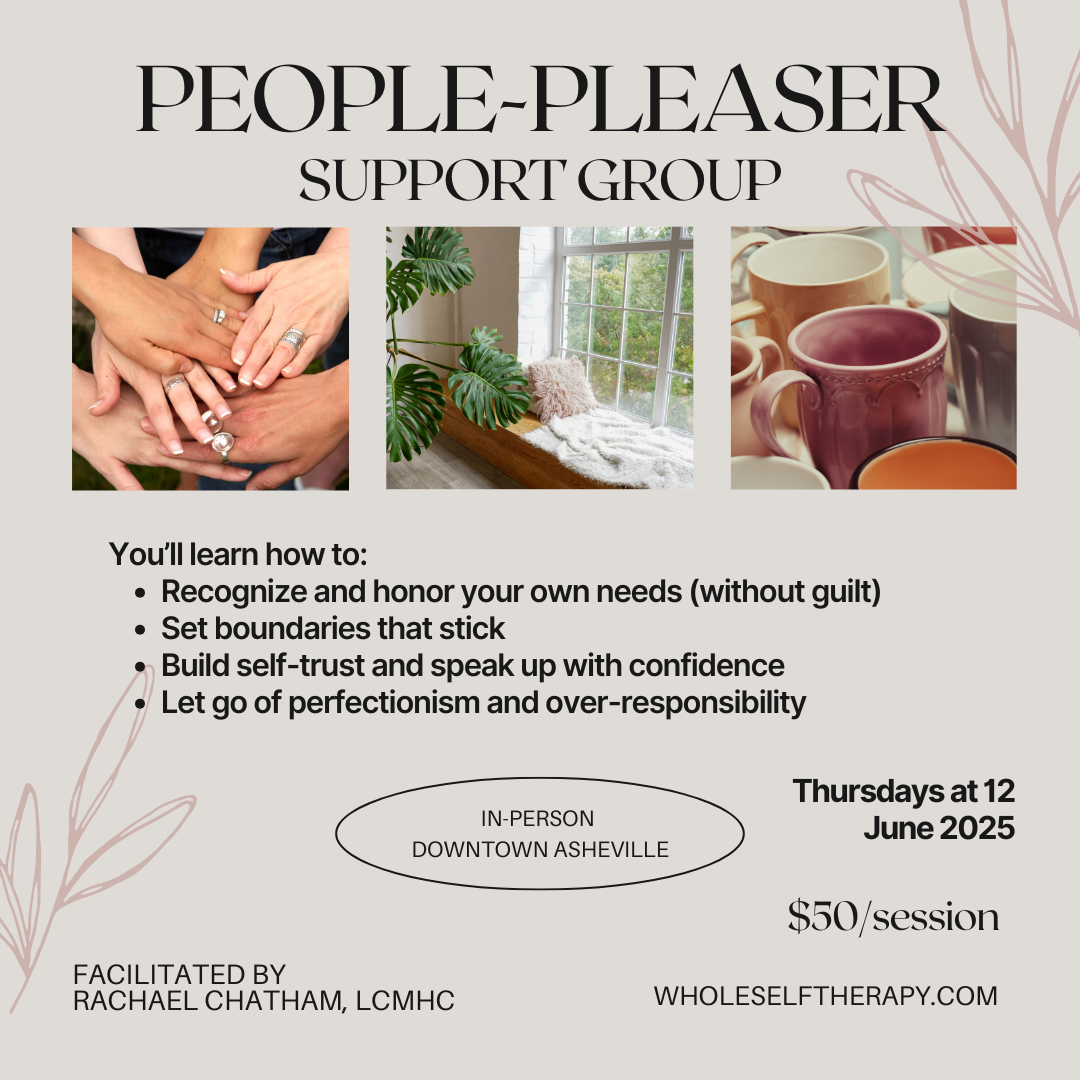Therapeutic Groups and Workshops
People-Pleaser Support Group
As a people-pleaser, you’re highly sensitive and have a talent for attuning to other people’s feelings, desires, and thoughts.
This capacity for reading the room, anticipating other people’s wants, and your innate ability to accommodate others is a key part of who you are.
It feels like you’ve always been this way.
And yet, you might also feel lost about what you’re doing with your life, or what you want.
You feel an inner sense of disconnection or feel unsatisfied with your life situation.
Perhaps the circumstances of your life, as a parent or caregiver, demand that you put other people’s needs before your own.
Finding the balance between taking care of others, something that comes so easily, and taking good care of yourself (which is much harder!) has been a real challenge.
Perhaps your relationships have been built on a foundation of your people-pleasing.
You may have attracted people who are happy to receive the gift of your attention. They may be quite happy to be on the receiving end of your generosity and kindness.
Shifting things in yourself (first) and in your relationships (second) can be incredibly hard to do alone.
The good news is that you don’t have to.

Signs You May Self-Sacrifice
- You’re preoccupied with what others might think, feel, or want
- You have a hard time receiving from others
- You tend to feel selfish or guilty for pursuing what you want
- Anger and resentment can simmer below the surface of your awareness
- Sometimes you explode and it seems to come “from out of nowhere”
- You take on a significant amount of responsibility for others

Risk Factors That Lead to People-Pleasing
- Growing up in a household that included a parent that was addicted or abusive
- Family dynamics that included enmeshment or didn’t allow for individual identities with your own preferences and interests; privacy and separateness were discouraged
- Having a narcissistic parent who was more focused on meeting their own needs than meeting yours
- Growing up with a parent who was depressed or who struggled with emotional regulation and may have gone into frequent rages
Group Focus Will Include:

Learning
Learn more about the early origins of this relationship pattern. Deepen understanding about when and how this started and figure out how to skillfully work with it in your everyday life.

Connection
Share your experience and listen to others’ stories about their struggle with this challenging relational dynamic. Get support from people who can relate.

Better Communication
Get tips and tricks to help you become a better communicator. Develop the confidence to speak what’s true for you instead of avoiding important conversations.

Self-Awareness
Cultivate the skills to know what you feel, think, want and need. Bring some of the focus and attention that you freely give to everyone else home to yourself.
People-Pleasing Stats (You're Not Alone!)
- Adults who say they go to great lengths to avoid conflict 66%
- People who say they often feel as if they can’t say no when someone asks for something 52%
- Americans who say they put other people’s needs and feelings first at the expense of their own 64%
- Women who say they feel responsible for other people’s feelings 46%
*From a 2022 YouGov Survey of 1,000 U.S. Adults

This group will be offered in-person at my downtown Asheville office or online starting in June.
Meetings will be on Thursday afternoons from 12 – 1:30.
The group will be $50 per session, with a two-month commitment strongly encouraged.
Get the support you need to stop self-sacrificing.

Awaken Your Authentic Feminine Self
A six-week workshop for women who are ready to stop self-sacrificing and start cultivating their Sacred Self.
Incorporating archetypal “parts” work, we explore and integrate four key aspects of all women who are stuck in the cycle of constant people-pleasing. Those parts include:
- The Girl Child
- The Inner Critic
- The Enlightened Rebel
- The Goddess
This group includes both group discussions and creative experiential exercises, which will include:
- Writing Prompts
- Mindful Meditation
- Guided Imagery
- Active Imagination
- Archetypal Symbol Appreciation
